Filter by
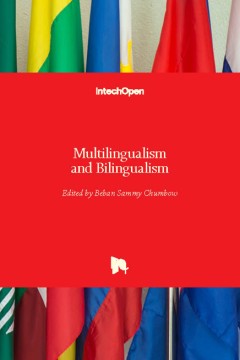
Multilingualism and bilingualism
Research in the area of bilingualism and multilingualism invariably produces fascinating insights. In the Europe of yesteryears, the paradigm of one nation one language was dominant and fashionable as a nation-building ideology that multilingualism was considered a curse, a demon that had to be exorcised. Today, the avalanche of empirical evidence of research findings has established multilingu…
- Edition
- -
- ISBN/ISSN
- 9781838813321
- Collation
- 184 p.; 23 cm.
- Series Title
- -
- Call Number
- 306.449 MUL m
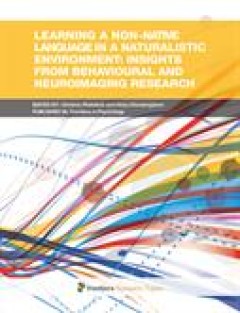
Learning a non-native language in a naturalistic environment: Insights from b…
It is largely accepted in the relevant literature that successful learning of one or more non-native languages is affected by a number of factors that are independent of the target language(s) per se; these factors include the age of acquisition (AoA) of the target language(s), the type and amount of formal instruction the learners have received, as well as the amount of language use that the l…
- Edition
- -
- ISBN/ISSN
- 9782889196395
- Collation
- 150 p.; 22 cm.
- Series Title
- Frontiers Research Topics
- Call Number
- 306.446 PLI l
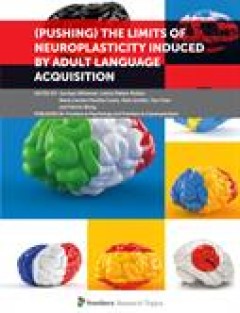
The Limits of neuroplasticity induced by adult language acquisition
Most adults attempt to learn a second or even third language at some point in their life. Since language exposure is one of the most intense cognitive training regimes one can encounter, it is not surprising that previous research has shown that multilingualism can induce profound change in the brain or ‘neuroplasticity’.What remains unclear is the scope of such adult language learning indu…
- Edition
- -
- ISBN/ISSN
- 9782889456406
- Collation
- 157 p.; 22 cm.
- Series Title
- Frontiers Research Topics
- Call Number
- 306.446 PAB l
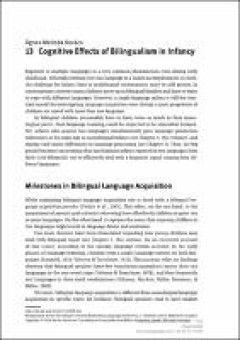
Chapter 13 Cognitive effects of bilingualism in infancy
Exposure to multiple languages is a very common phenomenon even during early childhood. Although learning just one language is a major accomplishment in itself, the challenge for infants born in multilingual environments must be still greater. In contemporary societies many children grow up in bilingual families and have to learn to cope with different languages. However, a single language mili…
- Edition
- -
- ISBN/ISSN
- 9783110610468
- Collation
- -
- Series Title
- -
- Call Number
- 306.446 KOV c
Phonology in the bilingual and bidialectal lexicon
A conversation between two people can only take place if the words intended by each speaker are successfully recognized. Spoken word recognition is at the heart of language comprehension. This automatic and smooth process remains a challenge for models of spoken word recognition. Both the process of mapping the speech signal onto stored representations for words, and the format of the represent…
- Edition
- -
- ISBN/ISSN
- 9782889452101
- Collation
- 185 p.; 23 cm.
- Series Title
- Frontiers Research Topics
- Call Number
- 414 DAR p

Developmental, modal, and pathological variation linguistic and cognitive pro…
One significant area of research in the multifaceted field of bilingualism over the past two decades has been the demonstration, validation, and account of the so-called ‘bilingual advantage’. This refers to the hypothesis that bilingual speakers have advanced abilities in executive functions and other domains of human cognition. Such cognitive benefits of bilingualism have an impact on the…
- Edition
- -
- ISBN/ISSN
- 9782889456383
- Collation
- 179 p.; 23 cm.
- Series Title
- Frontiers Research Topics
- Call Number
- 404.2 DEV d
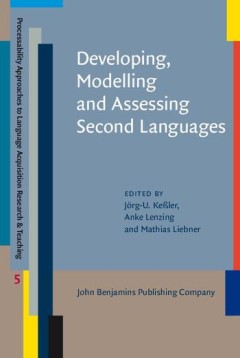
Developing, modelling and assessing second languages
This edited volume brings together the work of a number of researchers working in the framework of Processability Theory (PT), a psycholinguistic theory of second language acquisition (SLA) (Pienemann 1998; 2005). The aim of the volume is two-fold: It engages with current issues in both theory development and theory application and focuses on theoretical developments within the framework of PT …
- Edition
- -
- ISBN/ISSN
- 9789027267191
- Collation
- xviii, 244p. : ill.
- Series Title
- -
- Call Number
- 401.93 DEV d
 Computer Science, Information & General Works
Computer Science, Information & General Works  Philosophy & Psychology
Philosophy & Psychology  Religion
Religion  Social Sciences
Social Sciences  Language
Language  Pure Science
Pure Science  Applied Sciences
Applied Sciences  Art & Recreation
Art & Recreation  Literature
Literature  History & Geography
History & Geography